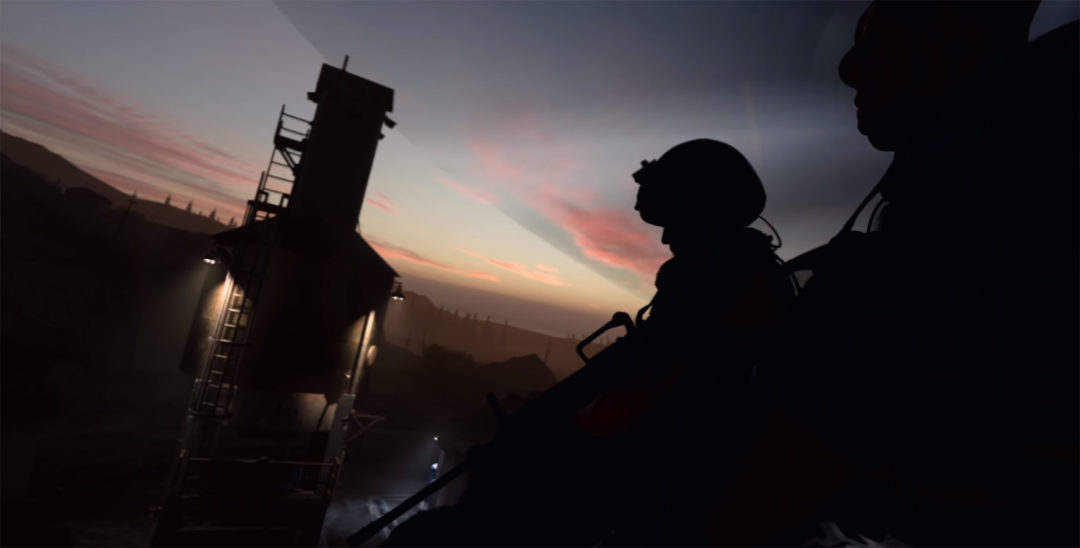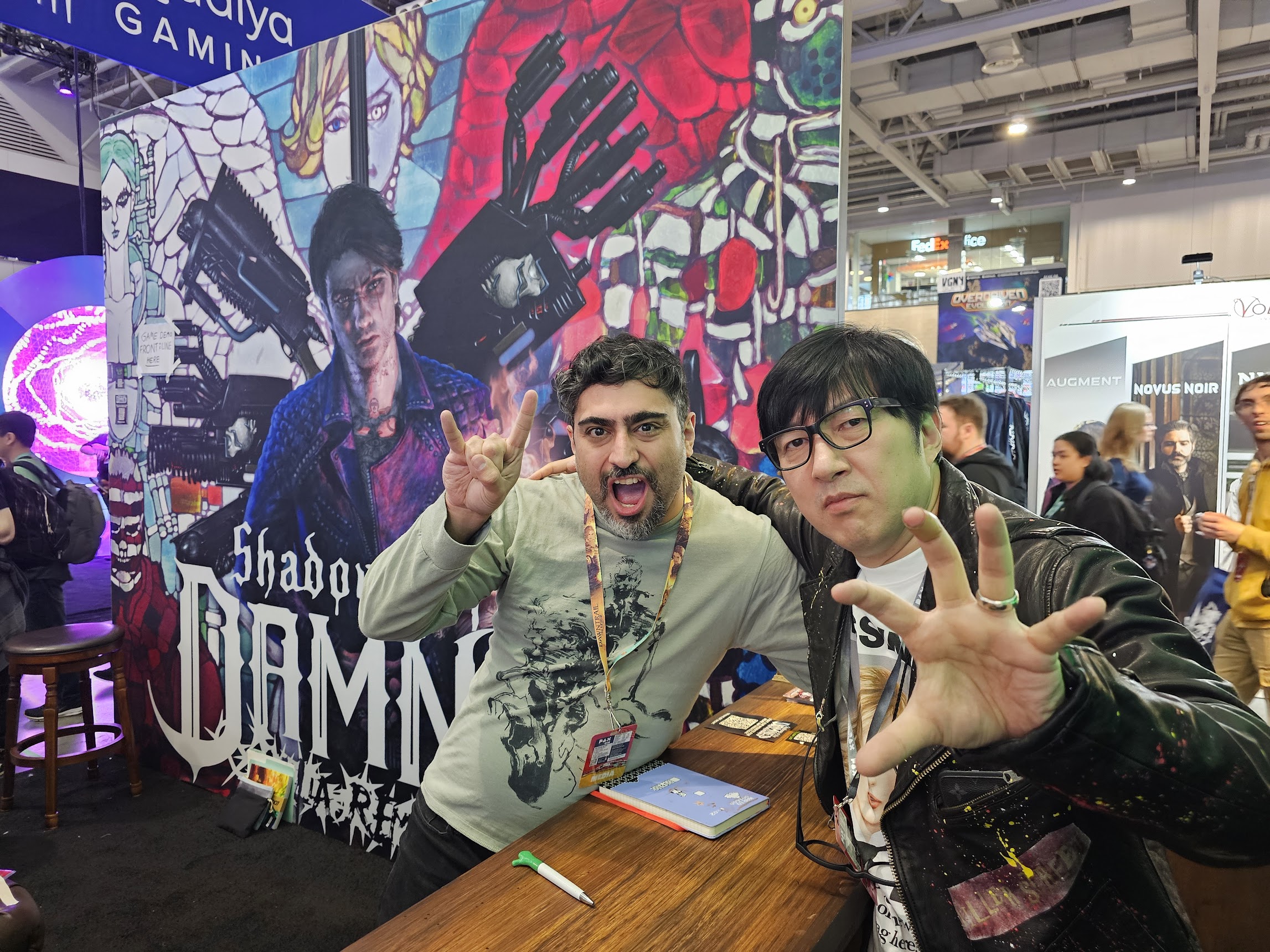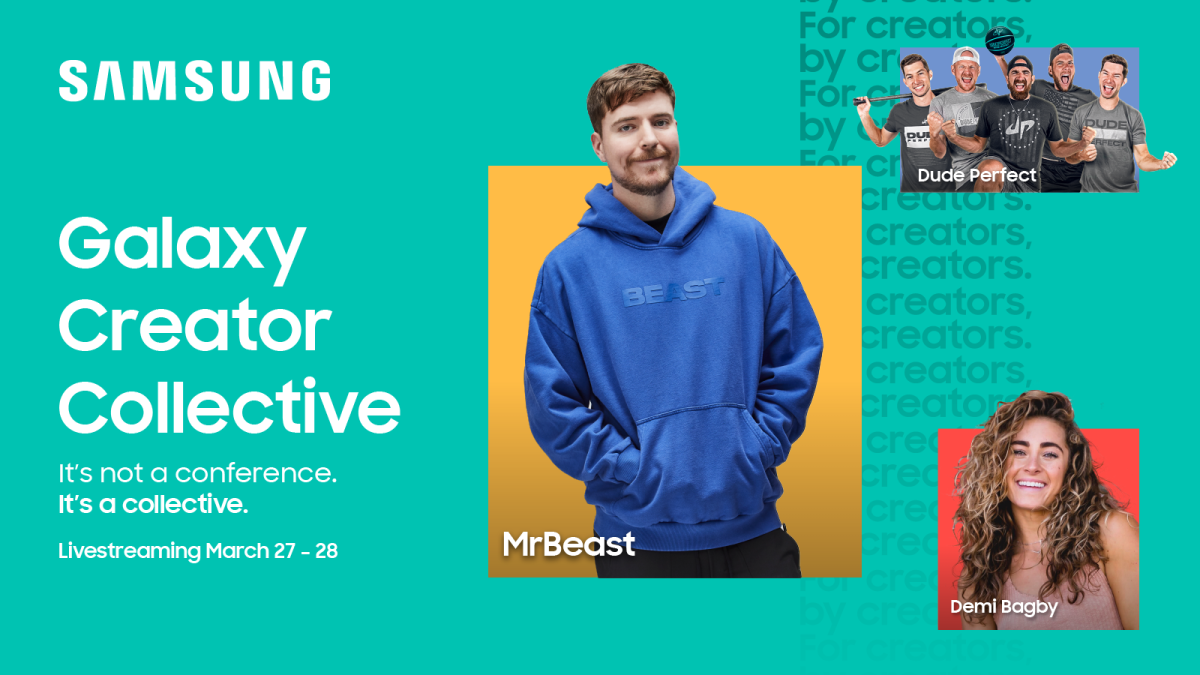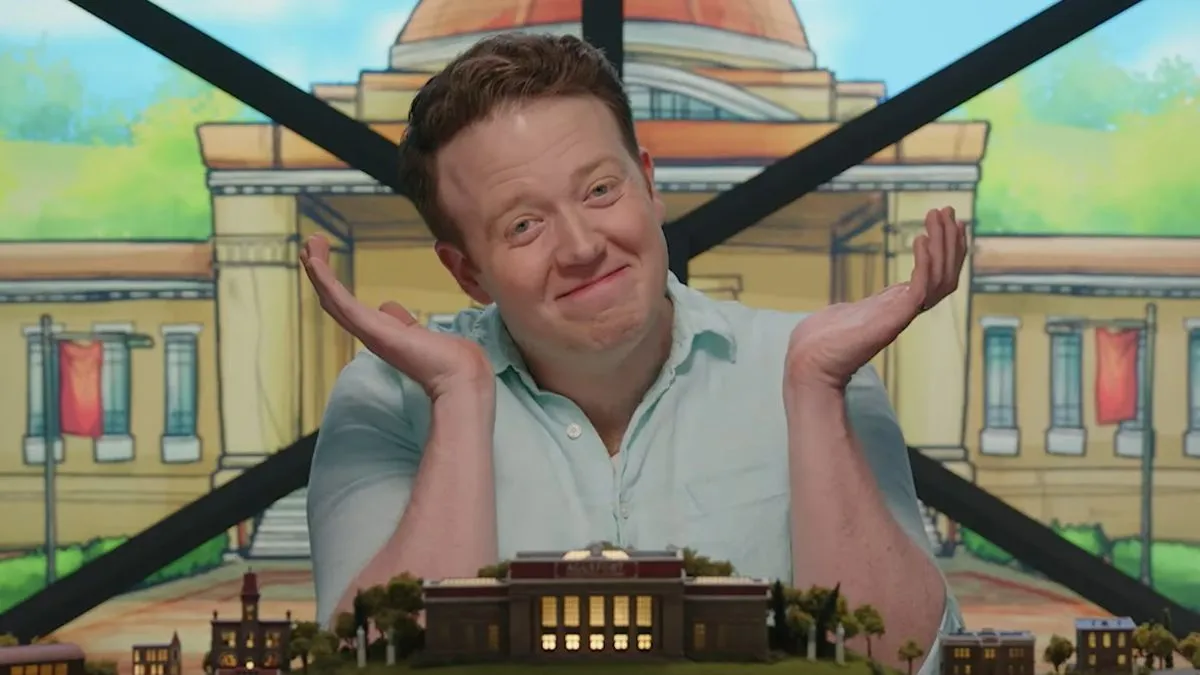As sure as the sun is to rise tomorrow, so too does a new Call of Duty release every fall. But per its release in the holiday season, it always has competition. This year includes big names like Stars Wars Jedi: Fallen Order, Death Stranding, Pokémon Sword and Shield, and more all launching over the next two months. It’s a busy schedule, but Call of Duty: Modern Warfare from developer Infinity Ward aims to grab the spotlight, as some analysts unsurprisingly predict it will be this year’s best-selling title.
From its storytelling to its more grounded push for realism, Modern Warfare seeks to subvert your expectations of a Call of Duty campaign. To learn more about the studio’s approach to narrative and the game itself, I had the pleasure of chatting with Infinity Ward narrative director Taylor Kurosaki about his experience at the studio and what he and his team hope to achieve with Call of Duty: Modern Warfare.
Escapist Magazine: Your journey through game development has landed you here as Narrative Director at Infinity Ward today. It’s a studio with a high pedigree since the original Call of Duty and singularly focused on the franchise. What made you want to join the team? Why Call of Duty?
Taylor Kurosaki: I had just wrapped up my work on Uncharted: Drake’s Fortune at the end of 2007 and had some time to play games during vacation. I picked up Call of Duty 4: Modern Warfare to check it out. During the “Crew Expendable” mission, as the cargo ship is sinking, I had to pause the game to wrap my head around what I was seeing. I could not believe what the guys from Infinity Ward had created. It was truly an action movie I could play. I think it’s safe to say that Naughty Dog was inspired and challenged to up our cinematic set-piece chops from playing that first Modern Warfare. The opportunity to work at Infinity Ward and now continue this seminal series is the pinnacle of my career.
The last release from Infinity Ward (Infinite Warfare) was a pretty big departure for the series. You took Call of Duty to space and added actual side missions, a galaxy map of sorts, dogfighting, and even a pseudo hub area. What was the push behind all of that?
Kurosaki: Our goal when setting out to make Infinite Warfare was to allow our players to be the captain of what is essentially a space aircraft carrier. This meant we needed to give them the freedom to pilot the ship where they wanted (galaxy map and side missions), have the sensation of the carrier being a living, breathing space where you’re the commander (hub), and the ability to actually go out on missions rather than being stuck on the bridge (dogfighting).
Since none of our players have actually piloted a ship like the Retribution IRL, we also had to train them how to be the captain. This necessitated a story where a soldier is thrust into the role of captain, where they have to learn on the fly, hence the continuous, no-cuts presentation. It’s a case of the narrative being inspired by the design (and vice versa). It was also Jacob Minkoff (Single-player Design Director) and my first game at Infinity Ward after coming from Naughty Dog. The story was inspired by the fact that he and I were also being thrust into new roles, just like Captain Nick Reyes.
On a personal note, I felt the script and line delivery in the game flowed quite well. The performances felt “natural” in ways many games don’t. Was that a point of focus for you and the team?
Kurosaki: It’s been a goal of ours to capture ever more natural performances for years. In the PS2/Xbox era, performances consisted of voice actors recording VO alone in a sound booth. In the PS3/360 generation, we integrated (motion capture). For the Xbox One/PS4 era we added facial capture along with voice and motion capture all simultaneously. Further, we rarely have single actors performing alone but instead capture scenes as an ensemble, acting and reacting off one another, to get the most organic results. We allow the cast to improvise, and I’ll sometimes give direction to only one of the actors, without the others overhearing my instructions. The next take, the reactions of the other actors are always fresh as they can’t anticipate what’s coming.
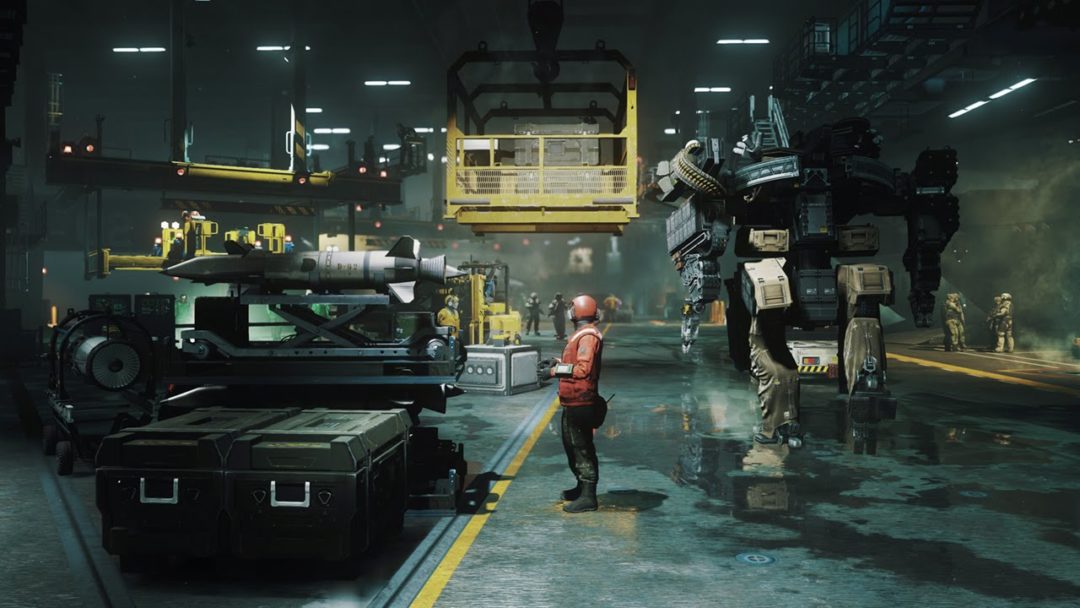
Right now we’re several weeks away from Modern Warfare. You’ve noted many times that you didn’t want to do a sequel to Modern Warfare 3 because of the state that world was left in. What made you want to do a Modern Warfare reboot versus, say, a sequel to Ghosts or Infinite Warfare or even a completely new timeline? I imagine a desire from much of the fanbase to return to modern combat was a large factor, but was there anything else?
Kurosaki: A big factor for the team was the amount of time since the last Modern Warfare game. In the eight years since Modern Warfare 3, the world has changed in so many ways that to call this game “Modern Warfare” in 2019 meant lots of new fertile ground. The older games, and lots of war stories in general, center around western soldiers deploying overseas to fight “over there.” In the new Modern Warfare, we also delve into the other half of the story — the local civilian fighters defending their homeland from superior forces.
Design and story are inextricably linked, and in this case, the local perspective gave us some great new gameplay scenarios and characters whose perspectives are very different from the standard American G.I. You’ll get to know and play alongside freedom fighters who use improvised munitions and jury-rigged tech against foes who have fire superiority.
Captain Price has been featured quite a bit in all the promotional material. I get the feeling his character is a favorite around the studio.
Kurosaki: This, of course, is the other big reason to revisit the Modern Warfare universe. Price is such an iconic character, and this was an opportunity to delve deeper into the man behind the mustache — to portray him in a more relevant, more realistic, and more nuanced way than the other games could deliver back in the day. The tech puts us light-years ahead of the way Price was brought to life a decade ago. We found a living, breathing man to be Captain Price, not unlike the way the film version of a new Batman or Bond is cast. I can’t wait for the players to suit up alongside him and operate.

Significant effort has been put into its tone too. From hearing you and the rest of the team speak, you point out that it’s a “more grounded, serious game.” So, scenarios like playing as a child in a Middle Eastern village after a Russian attack or encountering a terrorist attack on London’s Piccadilly Circus are apparently just the tip here. How do you feel about the feedback from some previewers who think it might be too much? Were you ever worried about pushing it too far this time with its themes?
Kurosaki: We have made a story that is relevant to the situations found in the war on terror and in conflict zones today. We aren’t being flippant towards these subjects. We’ve spent years with consultants from the military, to cultural consultants, to reporters on the ground to make sure we are portraying things accurately. This isn’t about sophomoric shock value; it’s about telling a meaningful story where characters are thrown into conflict and need to resolve it.
Call of Duty campaigns have always been bombastic and larger than life, with action film-like sequences. You’ve emphasized that the game seeks to delve into the realism of war. There are some who, understandably, feel it’s impossible to accurately depict the realism, brutality, and inhumanity of war in a video game. Portraying reality with the desire to create something fun can be difficult and delicate. What do you say to those who share that concern? How did you try and find the right balance there?
Kurosaki: I reject using the term “fun” as a catch-all for the experience games should deliver. Do we use the term “fun” to describe what makes a novel or a film successful? How about engaging, thrilling, suspenseful, hopeful, thoughtful? In the same way that other forms of entertainment deliver the full spectrum of human emotions, the interactive medium should as well. The story of Modern Warfare is not depressing; it’s about the bonds between people, who share a common goal and set out to achieve it. There are moments of loss, moments of humor, and moments of celebration. It’s cathartic, and as strange as it sounds to say this, catharsis is fun.
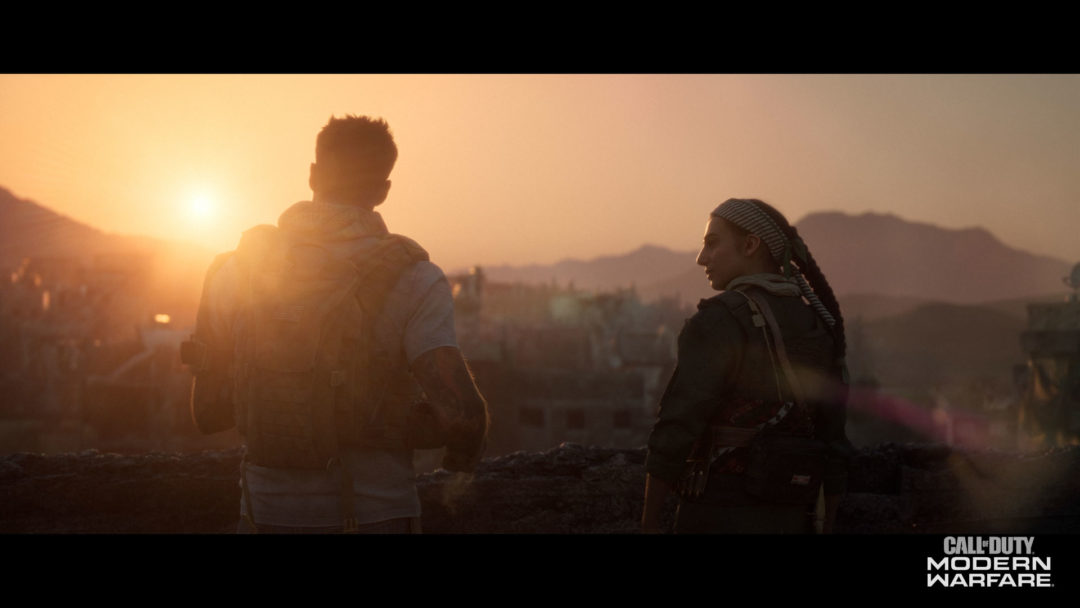
Has the move towards a grounded story affected how you design a campaign versus past games?
Kurosaki: Sure. A grounded story means it’s emotionally accessible. In the same way, we want the stakes of the gameplay to be relatable. Our design is edge-of-your-seat scenarios, grounded in a plausible reality.
For half of the game, you take control of Farah, a commander of Middle Eastern freedom fighters. We don’t know the full context to the story and how her group and Price’s team come into contact, but putting players in the shoes of an Arab woman is a heavy but welcome move. As an Arab American myself, it’s a refreshing change of pace since people of Middle Eastern origins are very rarely the protagonists in games. What was the thought process behind making her playable?
Kurosaki: The emotional difference between film and games is with film, the audience can empathize with an external character they see on screen. With games, the player can empathize with a character by walking in that character’s boots, literally. If we want our players to fully understand what makes a character like Farah tick, the most effective way to do that is to play as her. Unfortunately, for many women in conflict zones in the Middle East, it’s necessary for them to take up arms to protect themselves, their families, and communities. It would have been a huge omission not to create a character like Farah.
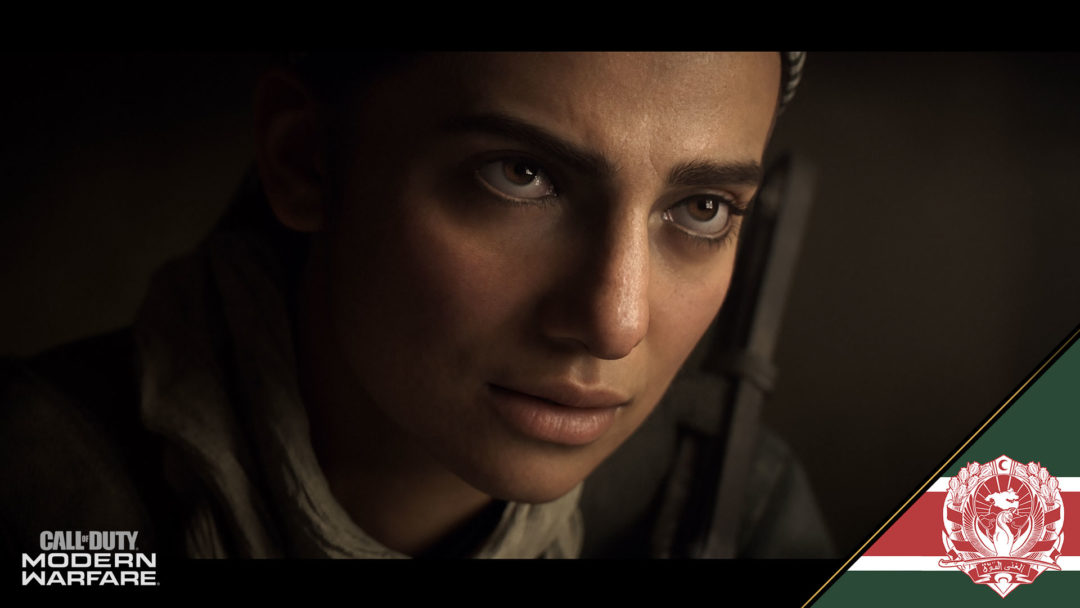
Most Call of Duty campaigns can be finished in anywhere from 4 to 8 hours depending on a person’s play style. How long will Modern Warfare take an average player? Would you say it’s the longest story so far?
Kurosaki: I’d say it’s the deepest story so far in Call of Duty. Play times should be in line with what fans expect from a Modern Warfare campaign.
Is there anything being implemented for replayability purposes? Some previous games in the series have had arcade modes for example.
Kurosaki: Yes! More info coming soon.
Have you gotten a lot of constructive feedback from the multiplayer alpha?
Kurosaki: A ton. Now that we’ve just completed weekend number two of our multiplayer beta, the team is working through the bugs and issues that cropped up to make this the best year ever for Call of Duty MP. The other modes benefit by these improvements as well.
Lastly, is there any particular aspect of the game you’re personally most excited for players to experience?
Kurosaki: I just want players to sit down and experience the campaign with an open mind. Put aside any preconceived notions you have about Call of Duty or Modern Warfare or games in general, and just dive in!

